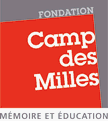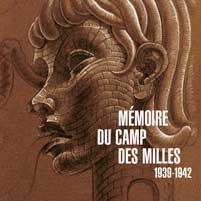
The Camp des Milles: a memorial site…
Atelier Novembre Winner of the European competition for the best renovation design for the Camp des Milles Memorial Site (2006)
With the Camp des Milles as its central axis, the project gradually reveals itself just as it reveals the different volumes of the building and chapters of history in a constant didactic to-and-fro. Shadowy half-lit corners, rays of light, tangled elements and dust are all evidence of the timeless nature of this site, touched up here and there by certain slight alterations – nothing more – so as to emphasise the general message. As the visit unfolds, collective history gradually reveals the story of the individuals whose lives were taken, and whose presence is only hinted at now by the ominous silence and ever-present shadows that lurk everywhere. An overwhelming feeling of emptiness fills the space, like a mournful expression of doubt, before we are plunged once again – travellers through time and space – into the current day and age and thus obliged to take up our particular stance. The road trodden by the deported, the wagon of remembrance and the large criss-crossing of railway lines, linked to the pain of deportation, lead us to reflect on our own lives.
As the last surviving eyewitnesses of World War II can still convey their message to us today, it has become absolutely imperative to assemble and organise sites that will perpetuate these memories so important in understanding our past and shaping our future: “The story of the Les Milles site illustrates a spiral of intolerance, individual cowardice and racist attitudes as well as behaviour showing extreme courage and resistance. It was in this quite ordinary place with ordinary people that this extraordinary story took place, which means, of course, that unless we are constantly on the look-out, it could happen again… (1)”
The project for the Memorial on the Camp des Milles site should contain and convey both history and modernity, memory and topicality, past and future, in its approach. All projected changes must redefine the site in view of its new functions, without changing its essential nature, thereby allowing a whole new rehabilitation. What is at stake here concerns both image and meaning. So the aim here is to ensure the site is properly presented throughout the different registers of its programme by guaranteeing an overall coherence whilst preserving it in its current state; through the introduction of new material and the use of different media, it must be able to convey a strong message as part of a citizenship, educational and cultural project.
1. François Guiguet, DPLG architect, responsible for planning the project.
Read an excerpt from the text by Robert Mencherini.
Read an excerpt from the text by Angelika Gausmann.
Read an excerpt from the text by Olivier Lalieu.
See a preview of the book. (Flash sequence)
Memory of the Camp des Milles 1939-1942
Photographs
Yves Jeanmougin
Texts
Robert Mencherini
Angelika Gausmann
Olivier Lalieu
Atelier Novembre
Preface by Alain Chouraqui
Photos published in this book were taken between 2008 and 2012.
Hardcover book / 27 x 27 cm in size / 240 pages /
360 illustrations in both b & w and colour
Métamorphoses / Le Bec en l’air (2013)
ISBN 978-2-916073-97-2
29 €
Also available in French:
Mémoire du camp des Milles 1939-1942
Edition produced in partnership with:

and with the help of:

This book is available at the Camp des Milles Memorial Site,
in bookshops or directly from:
Métamorphoses
Friche la Belle de Mai 41 rue Jobin 13003 Marseille / France

Download the order form
meta@metamorphoses-arts.com
Atelier Novembre Founded in 1989 by architects Marc Iseppi and Jacques Pajot, the Atelier Novembre group is very aware of the links between a building and its geographical and social environment, and has gained a special reputation for its projects on cultural material and architectural rehabilitation that combine both rigour and sensitivity, such as the historical mining centre of Lewarde, the Médiathèque des Ursulines in Quimper, Centquatre in Paris and the Ingres Museum in Montauban…

